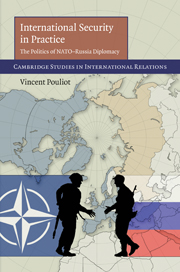Book contents
- Frontmatter
- Contents
- List of Figures and tables
- Preface
- Abbreviations
- 1 Introduction
- Part I Restoring the practical logic of peace
- 2 The logic of practicality: a theory of practice of security communities
- 3 A “sobjective” methodology for the study of practicality
- Part II The symbolic power politics of NATO–Russia diplomacy
- 7 Conclusion
- Bibliography
- Index
- Cambridge Studies in International Relations
2 - The logic of practicality: a theory of practice of security communities
Published online by Cambridge University Press: 03 May 2010
- Frontmatter
- Contents
- List of Figures and tables
- Preface
- Abbreviations
- 1 Introduction
- Part I Restoring the practical logic of peace
- 2 The logic of practicality: a theory of practice of security communities
- 3 A “sobjective” methodology for the study of practicality
- Part II The symbolic power politics of NATO–Russia diplomacy
- 7 Conclusion
- Bibliography
- Index
- Cambridge Studies in International Relations
Summary
Most theories of social action focus on what agents think about at the expense of what they think from. In IR, rational choice theorists primarily emphasize representations and reflexive knowledge in explaining political action. In the rationalist equation (desire + belief = action), ideas factor in an individual calculation informed by intentionality. Agents deliberately reflect on the most efficient means to achieve their ends. For their part, several constructivists theorize that norms and collective identities reflexively inform action. Intersubjective representations of reality, morality or individuality determine socially embedded cognition and action. In a related fashion, Habermasian constructivists concentrate on collective deliberation and truth-seeking as a form of communicative action. Overall, the three logics of social action that have the most currency in contemporary IR theory – the logics of consequences, appropriateness and arguing – suffer from a similar bias toward representational knowledge. Conscious representations are emphasized to the detriment of background knowledge – the inarticulate know-how from which reflexive and intentional deliberation becomes possible.
In and of itself, this focus on representational knowledge is not necessarily a problem: the logics of consequences, appropriateness and arguing cover a wide array of social action, as recent studies about socialization in Europe have demonstrated. The problem rests with the many practices that neither rational choice nor rule-based and communicative action theories can explain properly. Take the case of diplomacy, perhaps the most fundamental practice in international politics. For most IR theorists, diplomacy is primarily about strategic action, instrumental rationality and cost-benefit calculations.
Information
- Type
- Chapter
- Information
- International Security in PracticeThe Politics of NATO-Russia Diplomacy, pp. 11 - 51Publisher: Cambridge University PressPrint publication year: 2010
Accessibility standard: Unknown
Why this information is here
This section outlines the accessibility features of this content - including support for screen readers, full keyboard navigation and high-contrast display options. This may not be relevant for you.Accessibility Information
- 2
- Cited by
